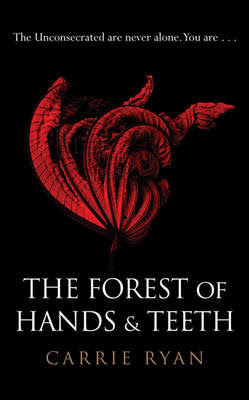ISBN: 978-0385736817 (UK)
I received Carrie Ryan's The Forest of Hands and Teeth for Christmas. I had been really excited to read it ever since I read a recommendation for it online. It's got a great premise—several generations after the zombie apocalypse, Mary lives in a small village surrounded by a chain-link fence. Outside the fence is a forest teeming with the undead, eternally hungry for human flesh—the Forest of Hands and Teeth. Inside the fence is a world ruled by the Sisterhood, a mysterious religious organization that controls the marriage, breeding, and education of the villagers. Protecting everyone from the Unconsecrated living dead are the Guardians, who patrol the forest killing the zombies and repairing the fences. There is a fenced-in path that leads away from the settlement, but it is off-limits and no one seems to remember where it leads. As far as the village inhabitants are concerned, they are they only survivors of the human race.
I read the first few chapters eagerly, happy to explore this strange other world. Orphaned and cast away from her family home, which now belongs to her brother, Mary is forced to live a sort of convent lifestyle as a ward of the Sisterhood, the head of whom is the stern and watchful Sister Tabitha. Here I think it would have been interesting for Mary to learn much more about the ominous, somewhat sinister organization that is the Sisterhood. And while she does do some snooping and learns a few things—many which are never fully explored—the narrative focuses much more on Mary's emotional turmoil as she becomes involved in a sort of love-square with three of her best friends.
One thing I really like about the book was that it has a bold, proactive heroine, which is a nice change from the feeble damsels in distress that populate many other contemporary young adult books. Many passages in The Forest of Hands and Teeth are beautifully written, and the story kept me reading to the end. In fact, I'm curious enough about the unanswered questions to read the sequel when it comes out a couple of months from now.
I read the first few chapters eagerly, happy to explore this strange other world. Orphaned and cast away from her family home, which now belongs to her brother, Mary is forced to live a sort of convent lifestyle as a ward of the Sisterhood, the head of whom is the stern and watchful Sister Tabitha. Here I think it would have been interesting for Mary to learn much more about the ominous, somewhat sinister organization that is the Sisterhood. And while she does do some snooping and learns a few things—many which are never fully explored—the narrative focuses much more on Mary's emotional turmoil as she becomes involved in a sort of love-square with three of her best friends.
One thing I really like about the book was that it has a bold, proactive heroine, which is a nice change from the feeble damsels in distress that populate many other contemporary young adult books. Many passages in The Forest of Hands and Teeth are beautifully written, and the story kept me reading to the end. In fact, I'm curious enough about the unanswered questions to read the sequel when it comes out a couple of months from now.




